- Home
- Lou Cameron
Renegade 31
Renegade 31 Read online
The Home of Great Western Fiction!
On the seething Mosquito Coast Gringo blasts a bandit army sky-high!
Captain Gringo, mercenary par excellence, becomes “General” Gringo to command a ragged banana republic army at war with mountain bandits. Woman trouble isn’t far behind, as he runs up against a lady lawyer and a lady photographer who are no ladies at all! But, getting down to military business, Gringo takes the field in a desperate last-ditch campaign against the terror-dealing bandit gang. After all, which is worse: facing death in combat, or in the corruption-riddled capital city where his life isn’t worth the price of a stick of dynamite?
RENEGADE 31: SHOOTOUT IN SEGOVIA
By Ramsay Thorne
First Published in 1985 by Warner Books
Copyright © 1985, 2018 by Lou Cameron
First Smashwords Edition: January 2018
Names, characters and incidents in this book are fictional, and any resemblance to actual events, locales, organizations, or persons living or dead is purely coincidental.
All rights reserved. No part of this book may be reproduced or transmitted in any form or by any means, electronic or mechanical, including photocopying, recording or by any information or storage and retrieval system, without the written permission of the author, except where permitted by law.
This is a Piccadilly Publishing Book
Published by Arrangement with the Author’s Agent.
The plotters agreed it was a shame they had to kill Belinda. She was beautiful, dedicated to their cause, and fantastic in bed. But war is hell. So less than two minutes after the general was in bed with Belinda, and probably in Belinda, the forty pounds of dynamite her co-conspirators had placed under her bed without bothering to inform her went off with a roar that rattled glass all over Ciudad Segovia, and there wasn’t enough left of Belinda—or the general—to scoop up with a spoon.
At the military presidio on the far side of town the colonel winced at the sound of the explosion, even though he had no reason to be surprised, if his office clock was accurate. It was after midnight, but the colonel sat fully dressed behind his desk just in case he’d be called upon to take command should anything unforeseen happen to his commander-in-chief. The office door opened and his aide-de-camp and lieutenant colonel came in. The colonel smiled innocently and said, “I just heard what sounded like a great explosion. Have you any idea what it might have been?”
The lieutenant colonel replied, “Coitus interruptus,” before he shot the colonel six times with a .45. He was standing by the desk in a cloud of slowly thinning gunsmoke, smirking as he reloaded his revolver, when the major on duty that night as officer of the day burst in on him, gun in hand and backed by two enlisted riflemen, to demand, “What is going on in here? For why did you just assassinate the colonel?”
The lieutenant colonel ignored the three gun muzzles trained on him as he smiled wearily and explained, “It was not an assassination, Major. It was an execution. I have in my pocket documentary proof that the dead dog behind the desk planned to take over as commander-in-chief after engineering the assassination of our beloved general!”
The major kept his gun muzzle trained right where it was as he asked soberly, “Am I correct in assuming that great explosion we just heard somewhere in the night may indicate the plot succeeded?”
The lieutenant colonel reholstered his own pistol and took out a tattered sheet of memo paper as he nodded and replied, “Alas, I fear I may have been too late to save the general. I only found this incriminating document a few moments ago. You’d better read it. The traitor I just shot was not the only ranking officer in on the plot!”
The major didn’t take the bait. He simply pulled his trigger three times and blew the lieutenant colonel across the desk. He sprawled face down across his own earlier victim, just as dead.
The two guards stared, thunderstruck, but neither moved or, God forbid, thought to question the actions of a field-grade officer with a gun in his hand. But the major wanted to be popular with the army he now seemed to command. So he explained, “The idiot was only going to waste our time explaining his pathetic forgery, and he had a point about time being of the essence, muchachos. Robles, you will go at once to inform El Presidente and the other civilian officials what has happened here. Gomez, you will post yourself outside the door and allow no other officers in until El Presidente or at least his appointed delegate arrives with further orders! Are there any questions, muchachos?”
Robles gulped and said, “Si, my major. For how can I tell anyone what just happened here when I do not know what just happened here?”
The major sighed, smiled indulgently, and said, “It was another attempted military coup, of course. They just murdered the general. No doubt the colonel expected to take his place. But as we just saw, lieutenant colonels have ambitions, too. He intended to cover his own part in the plot with some sort of stupid document and—”
“Forgive me, my major, I mean no disrespect, but how do you know what is on that piece of paper he dropped if you shot him before you had a chance for to read it?”
The major made a mental note that Private Robles would either have to be promoted or shot as a traitor, now that he’d shown himself to be rather bright for a peon. But for the moment there was enough confusion around here. So the major said, “I did not bother to read his pathetic attempt at mysterious intercepted messages because this is a grave national emergency, not a stage play. Think, Robles! If you were plotting a military coup, would you write down all your plans on paper and then leave them where an officer who was not in on the plot could find them?”
Robles smiled sheepishly and said, “No, my major. Not even if I knew how to read and write. For why do you think he tried such a stupid trick on us, eh?”
“Because he was stupid, of course. Now it is up to us to act smart. You men have your orders. What are you waiting for?”
They didn’t have to be told again. In less than one full minute the major was alone in the office with the two dead plotters. So the first thing he did was lock the door and reload his own .45. Then he picked up the crumpled memo and, sure enough, the two-timing son of a bitch he’d had to shoot had framed, or, to be more accurate, named the colonel as the master-mind of the coup. The major made sure neither he nor any of his personal friends appeared on the mysterious list of traitors before he tucked it away for safe keeping instead of burning it. The enlisted men were sure to mention the damned note to the civilian members of the junta, and it was too bad at least five of the officers named, to the major’s knowledge, were innocent.
The major put his revolver away for now as he glanced at the wall clock. Then he rested one cheek of his rump on the commanding officer’s desk. Even if there hadn’t been two bodies oozing behind it, some might feel it was a little early for him to be seated in the late post commander’s place when they arrived. The major was a patient man. He’d waited this long to seize his chance. He could wait a little longer.
But now that he was, in fact, the highest-ranking officer in a rather modest army, the clock on the wall seemed to have stopped on him. It was going to take his runner at least five minutes to reach the presidential palace. El Presidente would no doubt dither at least half an hour before calling an emergency meeting of the junta and ...
“It’s a shame I didn’t think to bring a good book,” the major muttered aloud, reaching absently for the nearby cigar humidor on the colonel’s desk.
As expected, the humidor was stocked with Havana Perfectos. The late colonel had offered him one or two in the past when he’d been a good little boy. The major resisted the temptation to stuff his tunic pocket with expensive smokes. By morning this whole layout would be his in any case, and cigars kept better in a humidor. He bit off the swe
et end and struck a light as he chuckled and told the dead man out of sight on the floor behind him, “I admire your taste in tobacco, my colonel. It is too bad so many good cigars were wasted in your dumb ugly face, but now that I shall be in command of this man’s army—’
Then the cigar he was smoking exploded.
It was not a joke. It was not the usual trick cigar. The colonel, like many men who lived dangerously, had planned ahead. So the one or two cigars he kept on hand for particularly tiresome guests were loaded with buckshot as well as twice as much powder as a twelve-gauge shotgun shell.
When they broke down the door a few minutes later, they found three dead bodies in the office, and the major’s was by far the messiest.
He’d also been the last high-ranking member of the plot to replace the high command of the Segovian Army. So now there was no high command at all and, in fact, not a field-grade officer to be found with any military experience.
Like most governments, whether large or small, the provisional government of La Republica de Segovia ran on two levels: official and smoke-filled. So as the National Assembly tried to sort out the chaotic events of the night before in public, El Presidente Torrez and the more important if unofficial members of the local power structure met privately to see if and how they could save their more important derrières.
“I do not have to tell you, señores,” said El Presidente, “That before this day is over, if he does not already know, the rebel leader, El Viejo del Montaña, will have heard that our already too small army has been decapitated! God only knows how long it will take the old devil to take advantage of this grim situation. But one thing is certain. He will!”
A more important looking banana baron, smoking a cigar big enough to have grown on one of his plantations, growled, “How do we know that ghastly business last night was not, in fact, engineered by the damned rebel faction to begin with?”
El Presidente Torrez tried to hid his disgust. The man was most important, even if he was an ass. Torrez was a small, balding man who did not smoke cigars and tried to hide his contempt for people who were not as intelligent as himself. It took a lot out of him. Torrez was unusually bright for a Banana Republic politico.
He said, “I feel we can safely assume El Viejo del Montaña did not know of the plot in advance because, if he had, none of us would be sitting here alive at this moment! El Viejo del Montaña is, as we all know and as his name would indicate, a most dangerous assassin who leads an army of most dangerous assassins, no matter what he may say about land reform. But the rebels would not have stopped with the destruction of a few officers, señores. To blow up our commanding general, someone had to work here in the city, under the very noses of our army and police. Do you really think a monster like El Viejo del Montaña would stop at mining the bedroom of a mere puta when there are so many other more important targets for a rascal with high explosives?”
Another ass, who grew coffee but also smoked banana-sized cigars, flicked ashes on the rug and said, “I reproach you for dismissing our late general as unimportant, Señor El Presidente! Without our general, for how is our army to fight El Viejo del Montaña?”
There was a collective moan of agreement from the assembled big wigs. Torrez held up a hand for silence and said, “That is what I was coming to, señores. On my orders, our brave troops have set up a line of defenses around the capital, and in God’s truth it does not take a military genius to stop a frontal attack by unwashed, poorly armed guerrillas.”
A planter who grew manila hemp and smoked a cigar that smelled like rope as well objected. “The devil you say, Torrez! Our plantations, mines, and timber reserves are not here in Ciudad Segovia! The army we pay for is not supposed to sit here guarding the city walls from wicked boys with uncivilized pissing habits! We depend on the troops to keep El Viejo del Montaña up on his damned mountain, where he belongs!”
Another hidalgo, who grew newspapers instead of cash crops and was thus more important, chimed in with, “Es verdad! If the rebels are free to come down out of the Colon ranges without fear of our own forces, it will not matter whether they take the capital, here, or not! El Viejo del Montaña does not fight fair! He really means to murder big landlords and give their land to the campesinos! Let the unwashed peones dare to think the land they work is their own, for even a little while, and there is no telling how many of them we’ll have to kill to get it back from them again!”
El Presidente Torrez saw his upraised hand wasn’t making much of an impression. So he stood, climbed up on his chair, and yelled, “For God’s sake, shut up!”
It worked. The little junta leader pointed to an even smaller man, who’d been seated quietly in a corner of the smoke-filled room and said, “I did not call this emergency meeting for to tell you all how I intend to lose. I am not El Presidente this morning because I make a habit of losing. We are agreed the situation is grave. Now I wish for you all to listen to our good friend from England, Sir Basil Hakim!”
Calling the small gray eminence in the corner anyone’s friend was stretching it. A lot of Queen Victoria’s subjects would have objected vigorously to calling Sir Basil Hakim an Englishman. The diminutive, dapper man with the diabolic gray beard was a British subject and, in fact, a peer of the realm, even if at least one belted earl had suffered a stroke on seeing his name on the Honours List one grim gray morning. Hakim had been born on some vague date in the area of Constantinople as a Turkish subject. Those self-respecting Turks who knew anything about him insisted he couldn’t be a Turk, but the Greeks of Constantinople were hasty to assure anyone who asked that he was really the unwanted child of a Russian whore. Russians familiar with Constantinople were willing to admit there might be a few Russian whores in Constantinople, provided one would accept their word that Basil Hakim had to be a Jew. Since no Jewish businessmen had anything to do with an avowed anti-Semitic like Sir Basil Hakim, the Jewish community had no theory about his probable parentage, save that, whatever he might be, he was an utter bastard. Edward, Prince of Wales, and his other pals in London were content to call Sir Basil ‘The Merchant of Death’ and let it go at that. It was an established fact the little fiend could fix one up with a battleship, a very beautiful mistress, or anything else one wanted, if the price was right. Most of the men in the smoke-filled room had never heard of Sir Basil Hakim. La Republica de Segovia was a backward country. But the international wheeler and dealer was used to treating with backward politicos. So he got right to the point.
In a surprisingly deep voice for such a little man, Hakim told them, “My own agents told me some time ago that you had an army with too many people who wanted to be chiefs and not enough people who wanted to be Indians. So I have taken the liberty of sending for outside professional help. Your new commanding officer will be here any day now, whether he knows it yet or not.”
The big banana man frowned and asked, “Who is this new general you speak of, señor? One of your relatives in the British Army?”
El Presidente shot the offensive planter a warning look, but Hakim chuckled fondly and replied, “I don’t have any relatives in any army. I’m not a Latin American. When I want a man to do a job for me I hire him on his qualifications, not because he’s a second cousin twice removed. As a matter of fact, the man I have in mind for you doesn’t seem to like me, for some reason. So your president and I have agreed I’m to have no official part in recruiting him and his aide. As far as anyone outside this room should ever know, my Woodbine Arms Limited interests are merely concerned with mineral rights in your country, eh what? It’s to my interest as well as yours that we restore a bit of law and order around here so we can all get on with business as usual.”
The coffee magnate shrugged and said, “We are not going to do any kind of business with El Viejo del Montaña in control of the open country all about, señor. Tell us more of this great general of yours, eh?”
Hakim was one of those treacherous liars who liked to keep people off base by telling the truth whenever po
ssible. So he said, “Actually, neither of the men we’re recruiting has ever held field-grade rank in any serious army. The man I have in mind for your new general is a North American named Richard Walker. He’s a graduate of West Point who served in the Indian-fighting U.S. Army as a cavalry troop commander during the business with Geronimo and all that rot. So he ought to be able to handle your local El Viejo chap, eh what?”
The trouble with smoke-filled rooms was that there was always a wiseass in the crowd. The newspaperman gasped and shouted, “Are you loco en la cabeza? I have heard of this Ricardo Walker! The pobrecitos call him Captain Gringo! He is no Americano officer! He is a renegade from the U.S. Army with a price on his head!”
Sir Basil sighed and said, “That’s their problem. Your problem is that you’re facing a large and bloody-minded rebel faction, led by a damned fine expert in guerrilla warfare, without an officer in your bloody little army fit to wipe his boots! Shut up. I’m not finished. Dick Walker is a professional soldier, not somebody’s ruddy son-in-law. In addition to being a West Pointer—which makes him more a soldier than the flaming general you just lost—Walker, or, have it your way, Captain Gringo, is also a trained ordnance officer who not only knows the new machine guns but can fire one from the hip, and even better, hit what he’s aiming at! His older sidekick, Gaston Verrier, held a commission in the French Army during the Franco Prussian War. I know the French lost that one, but Verrier and his men survived the Prussian steamroller at Sedan. So he must know what he’s doing, as well.”
“But Madre de Dios, this Verrier is well known as a renegade, too! It is a matter of record he deserted both the French Foreign Legion and the Mexican Army!”
“Picky, picky, picky. The Legion was losing when the chap went over to the winning side, and as for the Mexican Army’s silly warrant on him for desertion, they were planning to shoot the chap when he went over the hill on them. As a matter of fact, he was involved in a power play within the Mexican Army that rather resembled the one we had here last night. I just said Verrier was a born survivor, didn’t I?”

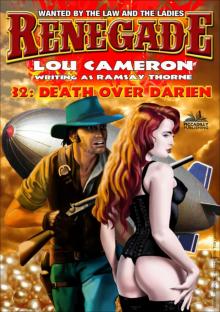 Renegade 32
Renegade 32 Renegade 31
Renegade 31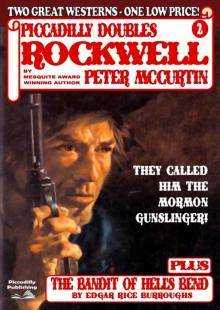 Piccadilly Doubles 2
Piccadilly Doubles 2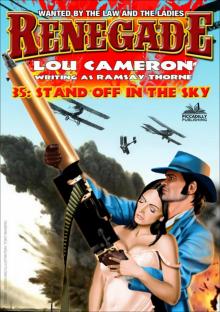 Renegade 35
Renegade 35 Stringer and the Hangman's Rodeo
Stringer and the Hangman's Rodeo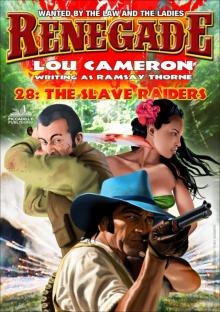 Renegade 28
Renegade 28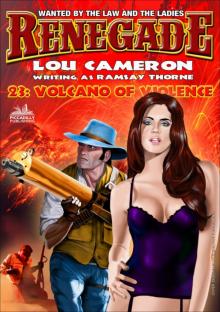 Renegade 23
Renegade 23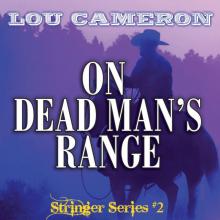 On Dead Man's Range
On Dead Man's Range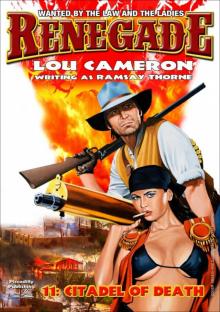 Citadel of Death (A Captain Gringo Western Book 11)
Citadel of Death (A Captain Gringo Western Book 11)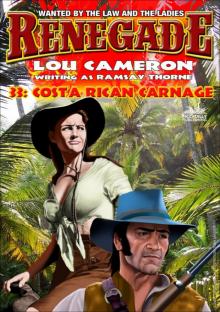 Renegade 33
Renegade 33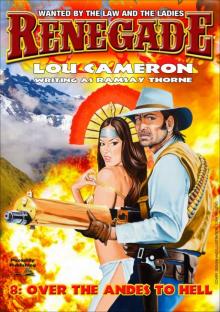 Over the Andes to Hell (A Captain Gringo Western Book 8)
Over the Andes to Hell (A Captain Gringo Western Book 8)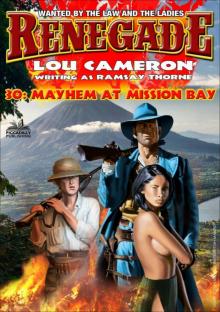 Renegade 30
Renegade 30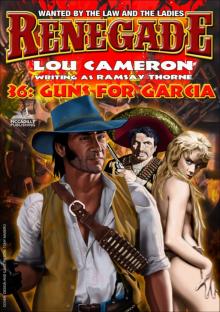 Renegade 36
Renegade 36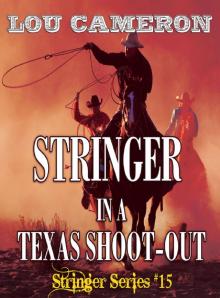 Stringer in a Texas Shoot-Out
Stringer in a Texas Shoot-Out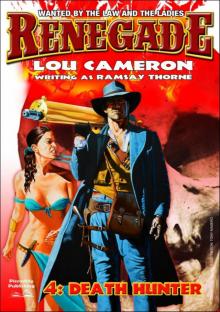 The Death Hunter
The Death Hunter Stringer and the Wild Bunch
Stringer and the Wild Bunch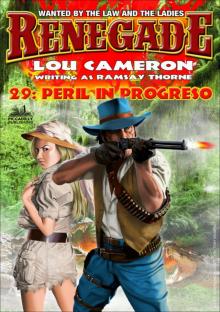 Renegade 29
Renegade 29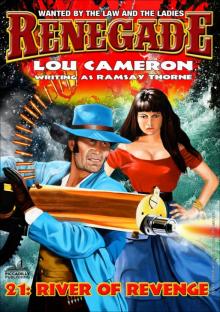 Renegade 21
Renegade 21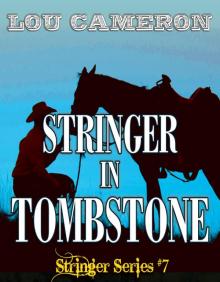 Stringer in Tombstone
Stringer in Tombstone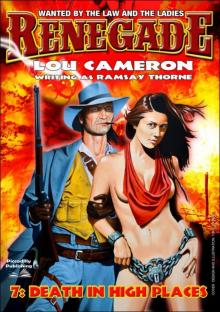 Death in High Places (A Renegade Western Book 7)
Death in High Places (A Renegade Western Book 7)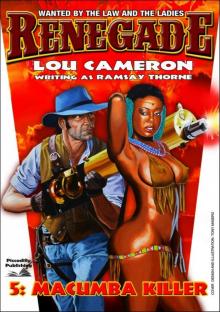 Macumba Killer
Macumba Killer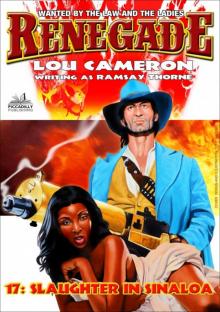 Renegade 17
Renegade 17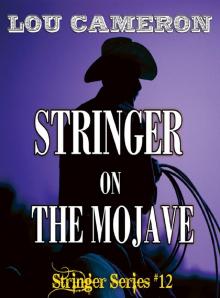 Stringer on the Mojave
Stringer on the Mojave Blood Runner
Blood Runner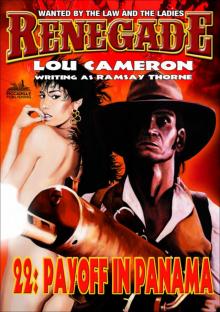 Renegade 22
Renegade 22 Stringer and the Hanging Judge
Stringer and the Hanging Judge Stringer and the Hell-Bound Herd
Stringer and the Hell-Bound Herd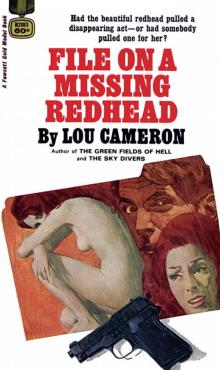 File on a Missing Redhead
File on a Missing Redhead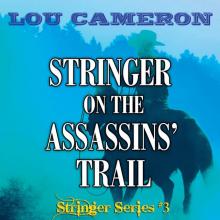 Stringer on the Assassins' Trail
Stringer on the Assassins' Trail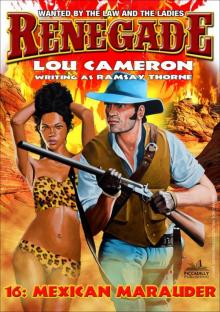 Mexican Marauder (A Captain Gringo Adventure #16)
Mexican Marauder (A Captain Gringo Adventure #16) Stringer
Stringer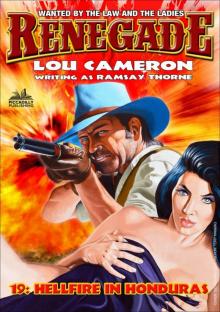 Renegade 19
Renegade 19 Stringer and the Oil Well Indians
Stringer and the Oil Well Indians Stringer and the Lost Tribe
Stringer and the Lost Tribe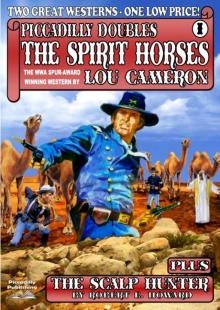 Piccadilly Doubles 1
Piccadilly Doubles 1 Stringer and the Border War
Stringer and the Border War Renegade
Renegade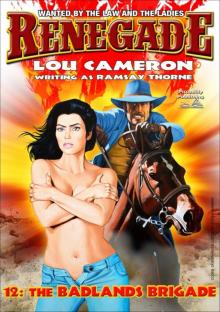 The Badlands Brigade (A Captain Gringo Adventure Book 12)
The Badlands Brigade (A Captain Gringo Adventure Book 12) Stringer and the Deadly Flood
Stringer and the Deadly Flood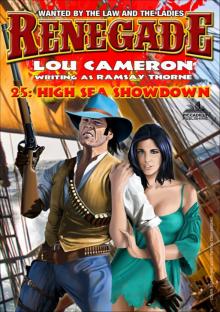 Renegade 25
Renegade 25 The Great Game (A Captain Gringo Western Book 10)
The Great Game (A Captain Gringo Western Book 10)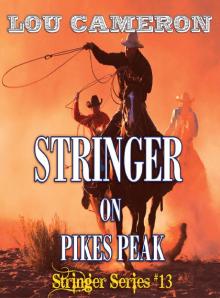 Stringer on Pikes Peak
Stringer on Pikes Peak